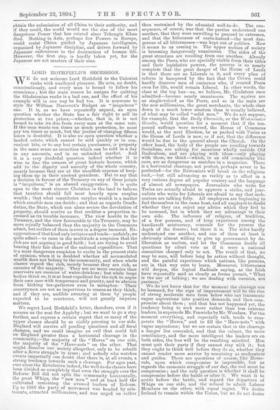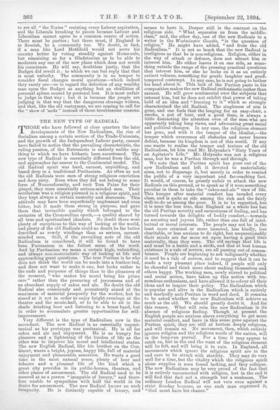LORD HOTHFIELD'S SECESSION.
WE do not welcome Lord Hothfield to the Unionist ranks with unalloyed pleasure. He acts, no doubt, conscientiously, and every man is bound to follow his conscience ; but the main reason he assigns for quitting the Gladstonian ranks is a bad one, and the effect of his example will in one way be bad too. It is nonsense to style Sir William Harcourt's Budget an "iniquitous" one. It is, as we have repeatedly argued, an open question whether the State has a fair right to sell its protection at two prices,—whether, that is, it is not bound to take its due from every man at the same rate. If the man wants ten times as much protection, he must pay ten times as much, but the justice of charging fifteen times is doubtful. It is also an open question whether a landed estate, which cannot be sold quickly or in con- venient bits, or to any but certain purchasers, is property in the same sense as securities which can be sold in a day in any amounts, and in an unlimited market. is i it is a very doubtful question indeed whether it s wise to fine the owners of great historic houses, which add to the dignity and amenity of the whole country, merely because they are at the unselfish expense of keep- ing them up in their ancient grandeur. But to say that a decision in favour of the Treasury on any of these points is "iniquitous," is an absurd exaggeration. It is quite open to the most sincere Christian in the land to believe that taxation should fall most heavily upon surplus wealth ; that what constitutes surplus wealth is a matter which sensible men can decide ; and that as regards Death- duties, the State, which can alone secure the devolution of property, should receive as first creditor a proportion in- creased as its trouble increases. The view hostile to the Treasury, and the view favourable to the Treasury, may be more equally balanced than the majority in the Commons admit, but neither of them is even in a degree immoral. Ex- aggeration of that kind only irritates and tends—unfairly,we quite admit—to raise in the multitude a suspicion that the rich are not arguing in good faith ; but are trying to avoid bearing their fair share of the national expenditure. That is a most dangerous suspicion to excite in the present state of opinion, when it is doubted whether all accumulated wealth does not belong to the community, and when whole classes regard the rich, merely because they are rich, as enemies of the majority. They are no more enemies than reservoirs are enemies of water-drinkers ; but while large bodies think so, it is at least expedient for the rich to argue their own case with temperance and gravity, and to abstain from kicking tax-gatherers even in metaphor. Their countrymen are not so impervious to reason as they think, and if they are, audible swearing at them by people expected to be courteous, will not greatly improve matters.
We regret Lord Hothfield's letter, therefore, even if it secures us the seat for Appleby ; but we want to go a step further, and express a certain regret that so many of the upper classes should be so visibly pressing to our side. England will survive all pending questions and all fiscal changes, and we could imagine no evil that could fall on England greater than a horizontal cleavage in the commun.ity,—the majority of the " Haves" on one side, the majo rrty of the "Have-nots" on the other. That might dissolve our society altogether, only to be rebuilt after a fierce struggle in arms ; and nobody who watches impartially mpartially can doubt that there is, at all events, a strong tendency towards such a cleavage. For ages past, ever since, the Revolution indeed, the well-to-do classes have been divided so completely that even the struggle over the Reform Bill did not split the community horizontally, the great Whigs, the " new men " and at least half the cultivated remaining the avowed leaders of Reform. Up to 1886 the party of movement was headed by aris- tocrats, attracted millionaires, and was urged on rather than restrained by the educated. well-to-do. The con- sequence, of course, was that the parties understood one another, that they were unwilling to proceed to extremes, and that the bitterness of caste-hatred—the most dan- gerous of all bitternesses—was kept out of politics. Now it seems to us coming in. The upper section of society is becoming dangerously unanimous. The sides of the great structure are receding from one another. Already among the Peers, who are specially visible from their titles and their legislative powers, the process is so nearly complete that the great danger of the House of Lords is that there are no Liberals in it, and every plan of reform is hampered by the fact that the Crown could hardly discover men of eminence who, if created Peers even for life, would remain Liberal. In other words, the class at the top has—as, we believe, Mr. Gladstone once admitted—become nearly unanimous. The squires are as single-voiced as the Peers, and so in the main are the new millionaires, the great merchants, the whole class down to a much lower stratum than is usually believed, of what may be called " solid. men." We do not suppose, for example, that the Daily Chronicle, or the Westminster Gazette, would question for a moment that if the ten- pound suffrage were revived, the House of Commons would, at the next Election, be as packed with Tories as the House of Lords is now, or if not, that the difference would be due to the quarrel about the Church. On the other hand, the body of the people are receding towards Socialism, are asking for measures wholly outside Old Radicalism, and are playing with ideas—only playing with them, we think—which, in an old community like ours, are as dangerous as matches in a magazine. There is a horizontal cleavage, not perfect, perhaps never to be perfected—for the Extremists will break on the religious rock,—but still advancing so visibly as to affect in a very curious degree all popular oratory and the language of almost all newspapers. Journalists who write for Tories are actually afraid to approve a strike, and jour- nalists who write for Liberals are afraid to say that mob- orators are talking folly. All employers are beginning to feel themselves in the same boat, and all employds to doubt whether they can reject any advice which they feel to be unsound, but in which they see advantage to their own side. The influence of religion, of tradition, of a few persons, and of long experience among the handicraft aristocracy, conceals for the present the depth of the fissure ; but there it is. The sides hardly understand one another, and one of them at least is obviously almost willing to give up government by de- liberation as useless, and let the Commons decide all questions by silent vote as if it were a national committee charged only to act. The result of that, we may be sure, will before long be action without thought, and the painful experience which nations, like persons, are in that way sure to learn. Moreover, bitternesses will deepen, the logical Radicals saying, as the Irish have repeatedly said as clearly as forms permit, " What is the use of talking; we are dealing with enemies, not partners." We do not know that for the moment the cleavage can be lessened, for the sign of improvement will be the rise of strong moderate men from below who can transmute vague aspirations into positive demands, and then com- promise about them ; and that has not happened yet, the tendency being to seek more rather than less extreme leaders, to supersede Mr. Fenwicks by Mr. Woodses. For the moment everything, and especially talk, tends to exas- perate the " Haves," and to fill the " Have-nots " with vague aspirations ; but we are certain that in the cleavage a danger lies concealed, and that the calmer, the more conciliatory, and the more intelligent the leaders are on both sides, the less will be the resulting .mischief. Men must quit their party if they cannot stay with it; but they ought to think well before they do so, whether they, cannot render more service by remaining as moderators and guides. There are questions of course, like Home- rule, upon which compromise is impossible, but as regards the economic struggle of our day, the end must be compromise ; and the only question is whether it shall be compromise before the battle or after it. We want it to arrive before the battle, and regard the departure of Whigs on one side, and the refusal to admit Labour Members on the other, with equal regret. We desire Ireland to remain within the Union, but we do not desire to see all " the Tories " resisting every Labour aspiration, and the Liberals breaking to pieces because Labour and Liberalism cannot agree to a common course of action. There must be parties ; but there must, if England is to flourish, be a community too. We doubt, in fact, if a man like Lord Hothfield would not serve his country better by voting steadily against Home-rule, but remaining so far a Gladstonian as to be able to moderate any one of the new plans which does not revolt his conscience. He will say, doubtless justly, that the Budget did revolt it ; to which we can but reply that that is most unlucky. The community is in no temper to consider fiscal changes moral questions—which indeed they rarely are—or to regard the defection of any wealthy man upon the Budget as anything but an ebullition of personal spleen caused by personal loss. It is most unfair to judge in that way ; but it is because the people are judging in that way that the dangerous cleavage widens, and that, like the old vestryman, we are coming to call for the " show of 'ands " instead of those troublesome reasons.



































 Previous page
Previous page